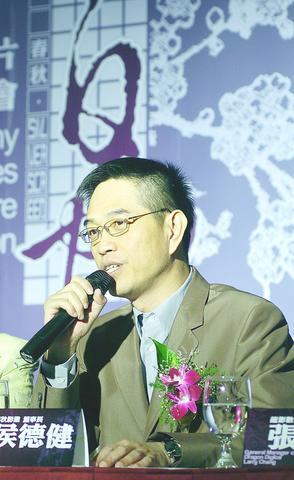Taiwan-based Equinox Film and New Zealand Silver Screen Films on Monday announced a plan to co-produce the classic Chinese mythical tale Lady White Snake (
The two companies signed the contract in Taipei on Monday, announcing the joint venture for the US$40 million project. Each side is responsible for raising 50 percent of the funds for the movie. If it proceeds as planned, the project will be the largest-budget movie in Taiwan's filmmaking history.
"We are very excited about this project. This joint venture has set up a framework for New Zealand and Taiwan filmmaking and we hope that this will help us move into a higher level of producing higher quality films," Lewis Holden, deputy minister of New Zealand's Ministry of Economic Development, said on Monday in Wellington through a video conference held in Taipei.

PHOTO: CHEN YI-CHUAN, TAIPEI TIMES
"We are pleased to be involved in this project," said Don Reynolds, CEO of Silver Screen Films. "When I read the story of Lady White Snake I was much intrigued and liked the story so much. For me, it's a good love story with well-developed characters," Reynolds said at the video conference.
The project was initiated two years ago by Richard Hou (
Over the past two years, Hou took the script to Hollywood and Japanese studios. "In the end, we decided to work with Silver Screen Films because it had the offer that we thought most beneficial for Taiwan's film industry as a whole," Hou said.
According to the contract, apart from co-producing the film with Equinox, Silver Screen Films' post-production wing Oktobor will also help Dragon Digital, its post-production counterpart in Taiwan, to set up a production line for special effects work and 3D animation.
The benefit for New Zealand is that the project will follow the precedents of The Last Samurai and the Lord of the Rings movies and have the film shot entirely in New Zealand.
"We will re-create the Hangzhou West Lake and the Gold Mountain Temple in the story of the Lady White Snake in New Zealand," Hou said.
Lady White Snake will be the first English-language film adaptation of the legend. The tale is about a white snake fairy transforming herself into a beautiful woman who then falls in love with a young scholar. But the romance is forbidden by the human world and also hindered by a malicious Buddhist monk.
The first film adaptation of the story was the Japanese-language Madame White Snake (1956) by director Shiro Toyoda. In 1962, there was Mandarin Hong Kong movie of a similar story. The most recent adaptation has been Hong Kong director Tsui Hark's (
Because the movie will be in English, Reynolds said the cast would have to be internationally known actors.
According to Hou, the first candidate for the monk Fa-hai (
Shooting is scheduled to start in 2006, at the latest.

Jan. 5 to Jan. 11 Of the more than 3,000km of sugar railway that once criss-crossed central and southern Taiwan, just 16.1km remain in operation today. By the time Dafydd Fell began photographing the network in earnest in 1994, it was already well past its heyday. The system had been significantly cut back, leaving behind abandoned stations, rusting rolling stock and crumbling facilities. This reduction continued during the five years of his documentation, adding urgency to his task. As passenger services had already ceased by then, Fell had to wait for the sugarcane harvest season each year, which typically ran from

It’s a good thing that 2025 is over. Yes, I fully expect we will look back on the year with nostalgia, once we have experienced this year and 2027. Traditionally at New Years much discourse is devoted to discussing what happened the previous year. Let’s have a look at what didn’t happen. Many bad things did not happen. The People’s Republic of China (PRC) did not attack Taiwan. We didn’t have a massive, destructive earthquake or drought. We didn’t have a major human pandemic. No widespread unemployment or other destructive social events. Nothing serious was done about Taiwan’s swelling birth rate catastrophe.

Words of the Year are not just interesting, they are telling. They are language and attitude barometers that measure what a country sees as important. The trending vocabulary around AI last year reveals a stark divergence in what each society notices and responds to the technological shift. For the Anglosphere it’s fatigue. For China it’s ambition. For Taiwan, it’s pragmatic vigilance. In Taiwan’s annual “representative character” vote, “recall” (罷) took the top spot with over 15,000 votes, followed closely by “scam” (詐). While “recall” speaks to the island’s partisan deadlock — a year defined by legislative recall campaigns and a public exhausted

In the 2010s, the Communist Party of China (CCP) began cracking down on Christian churches. Media reports said at the time that various versions of Protestant Christianity were likely the fastest growing religions in the People’s Republic of China (PRC). The crackdown was part of a campaign that in turn was part of a larger movement to bring religion under party control. For the Protestant churches, “the government’s aim has been to force all churches into the state-controlled organization,” according to a 2023 article in Christianity Today. That piece was centered on Wang Yi (王怡), the fiery, charismatic pastor of the